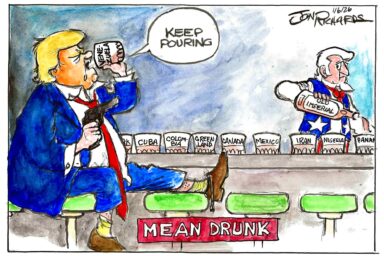Death of Iran’s President Adds Uncertainty to the Region’s Explosive Mix
Iran’s President Raisi, killed in a helicopter crash, was a hardliner. His death means change, but it’s not yet clear in what direction.
|
Listen To This Story
|
It is hard to know what to expect after the death of Iran’s President Ebrahim Raisi in a helicopter crash near the border of Azerbaijan. Iran’s foreign minister and the governor of Iran’s East Azerbaijan Province were also killed in the crash. They had just inspected a dam project not far from Azerbaijan.
Raisi, 63, who previously headed Iran’s judiciary, was elected president in 2021, with the lowest voter turnout in Iran’s history. Raisi, referred to by his detractors as “The Butcher of Tehran,” was already under US sanctions because of his role in ordering the execution of thousands of political prisoners in the 1980s following the Iranian Revolution. He was almost as brutal in putting down public protests. Iran has often been sensitive to the need to have a pressure release valve when it comes to dealing with the public. Under Raisi, the valve seemed to have been shut off. Public protests diminished, but public resentment was increasing.
As soon as Raisi’s death was confirmed, Supreme Leader Ayatollah Ali Khamenei, who assumed the mantle of supreme leader after the death of Ayatollah Ruhollah Khomenei, replaced him with a relative unknown, Mohammad Mokhber, who had been serving as vice president. Mokhber will serve as caretaker until new elections can be held.
Possibly more significant than Mokhber’s appointment is the fact that Iran’s new foreign minister, replacing Hossein Amirabdollahian, who also died in the crash, will be Ali Bagheri Kani, Iran’s current negotiator in multilateral talks concerning Iran’s potential for developing a nuclear weapon. Raisi, a close associate of Khamanei, was considered to be an extreme hardliner, but he was relatively isolated from any understanding of how the rest of the world really thought. Although Ali Bagheri Kani has been a tough negotiator who has taken pride in opposing the US in the past, he has also operated in less of a bubble and it is reasonable to expect that he will have a better understanding of what the rest of the world thinks thanks to his experience sparring with international negotiators.
Most experts don’t expect any immediate change in Iran’s posture. Although the presidency and cabinet handle day-to-day operations of the government, the real power in Iran resides with Ali Khamenei, a small group of close associates, and Iran’s Revolutionary Guards. Iran’s president and his cabinet serve more as a buffer between the real power wielded largely behind the scenes and the public at large. Raisi had not done a particularly good job at winning over the public, and it’s possible that Iran’s backroom political masters may even heave a sigh of relief now that he is no longer part of the scene.
There was some speculation in recent months that Raisi might be in the process of being groomed to replace Khamenei as supreme leader. Khamenei is getting a bit too old to hold on to office much longer. In the opposite vein, there was also speculation that Raisi might have been maneuvered into politically overexposing himself so that he could be neatly sidelined once he had lost sufficient political support. Public unrest has been steadily growing in Iran and Raisi appeared unable to do much to calm the situation.
A more likely candidate to replace Khamenei, now that Raisi is gone, is Khamenei’s second son, Mojtaba Khamenei, also a cleric. Mojtaba is believed to hold considerable power behind the scenes.
No one expects the sudden change in Iran’s official government to have any effect on Iran’s opposition to Israel or the situation in Gaza. So far, Iran is blaming the crash on American sanctions. The helicopter, a Bell utility helicopter that dates back to the Vietnam War, was one of the purchases the Shah of Iran made before the 1979 Revolution. Iran operates 15 of these helicopters but has not been able to buy American-made spare parts because of the sanctions. Always ingenious, the Iranians have managed to keep the machines flying by buying spare parts on the international black market, but as the crash demonstrates, that can be a risky proposition.
While the sudden upheaval in who runs Iran’s official government may not have any immediate impact on Iran’s politics, it introduces a new set of players. Change represents an opportunity to move in a new direction. For a certain period of time, with its support to Hamas, Hezbollah, and the Houthis, Iran seemed perilously close to starting a third world war. Iran now has a chance to decide where it wants to go next.




